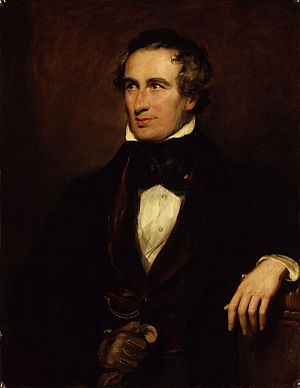John Burnet (painter) facts for kids
John Burnet (born in 1781 or 1784, died in 1868) was a talented Scottish artist. He was known for both his engraving and his painting.
Contents
Early Life and Training
John Burnet was born in either Edinburgh or Fisherrow, Scotland. His father worked as a high-ranking official for the government's tax department.
When he was young, John became an apprentice to Robert Scott, a skilled engraver. This meant he learned the art of engraving by working with Scott. Later, he continued his art education at the Trustees Academy.
Moving to London and Becoming an Artist
In 1806, John Burnet moved from Edinburgh to London, a much bigger city. There, he became a well-known painter. He painted many different types of pictures, including:
- Portraits (pictures of people)
- Landscapes (pictures of nature)
- Rural scenes (pictures showing country life)
He was very active in the art world. From 1808 to 1862, he regularly showed his artwork. He exhibited at important places like the Royal Academy and the British Institution. He also showed his art with the Society of British Artists. Because of his achievements, he was given a special membership to the Royal Society.
Engraving and Writing
Besides painting, John Burnet was also a very good engraver. He created pictures for famous books. For example, he made illustrations for:
- Poems by Robert Burns
- The Waverley novels by Walter Scott
He also made engravings of famous paintings and portraits by other artists.
John Burnet didn't just create art; he also wrote about it. He wrote manuals and books that taught people about drawing, painting, and different artists. He stopped working in public in 1860 and passed away in London.
Notable Engravings
John Burnet created many important engravings throughout his career. Here are a few examples:
- 1817: An engraving of Thomas Bewick, based on a painting by James Ramsay.
- 1820: An engraving of Thomas Moore, based on a painting by Sir Martin Archer Shee.
- 1828: An engraving of Thomas Campbell, based on a painting by Sir Thomas Lawrence.
- 1839: An engraving of the Duke of Wellington, a famous military leader.
- 1846: An engraving of 'The Challenge,' a painting by Sir Edwin Landseer.
 | William Lucy |
 | Charles Hayes |
 | Cleveland Robinson |


